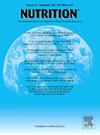Adherence to a gluten-free diet, depression, and nutrient distribution in participants with celiac disease
IF 3.2
3区 医学
Q2 NUTRITION & DIETETICS
引用次数: 0
Abstract
Background
Celiac disease (CD) presents formidable challenges, requiring rigorous adherence to a gluten-free diet (GFD)
Aim
In this study we probed the impact of GFD on depression in people with CD, analyzing depression prevalence across diverse backgrounds and scrutinizing the distribution of macro- and micronutrients.
Methods
Comprehensive data spanning National Health and Nutrition Examination Survey cycles (2009–2014) encompassed 70 CD participants and 271 individuals reporting general gluten issues. Employing SAS v9.4, merged cycles were scrutinized using unique identifiers, bolstered by sample weight and study design that reduced bias.
Results
While linear regression uncovered no significant depression, CD/GFD link and ethnicity exhibited notable significance. CD prevalence registered at 0.12 in Whites, a striking 3 to 6 times higher compared to other ethnic groups, with females encountering twice the prevalence. Nutritional deficits surfaced within both CD and GFD contexts, inclusive of negative correlations between carbohydrate intake and CD/GFD. The GFD cohort displayed reduced PUFA consumption, while deficiencies in essential micronutrients, encompassing Vitamins B1, D, and E, as well as calcium, also emerged prominently with the GDF group.
Conclusion
This study delved into the intricate interplay of dietary, mental health, and CD factors, furnishing comprehensive insights and a holistic framework for optimal management strategies for CD patients.
求助全文
约1分钟内获得全文
求助全文
来源期刊

Nutrition
医学-营养学
CiteScore
7.80
自引率
2.30%
发文量
300
审稿时长
60 days
期刊介绍:
Nutrition has an open access mirror journal Nutrition: X, sharing the same aims and scope, editorial team, submission system and rigorous peer review.
Founded by Michael M. Meguid in the early 1980''s, Nutrition presents advances in nutrition research and science, informs its readers on new and advancing technologies and data in clinical nutrition practice, encourages the application of outcomes research and meta-analyses to problems in patient-related nutrition; and seeks to help clarify and set the research, policy and practice agenda for nutrition science to enhance human well-being in the years ahead.
 求助内容:
求助内容: 应助结果提醒方式:
应助结果提醒方式:


